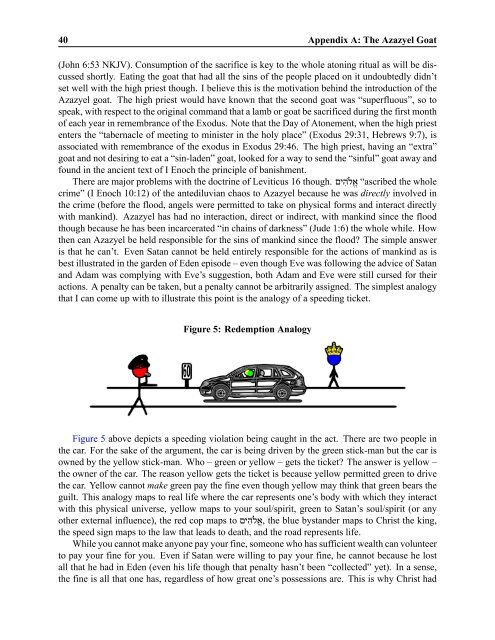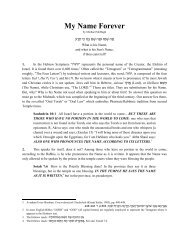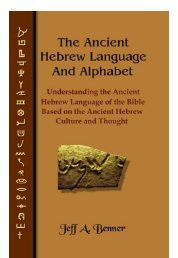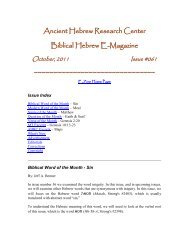Dating the Book of Job (PDF) - Ancient Hebrew Research Center
Dating the Book of Job (PDF) - Ancient Hebrew Research Center
Dating the Book of Job (PDF) - Ancient Hebrew Research Center
You also want an ePaper? Increase the reach of your titles
YUMPU automatically turns print PDFs into web optimized ePapers that Google loves.
40 Appendix A: The Azazyel Goat<br />
(John 6:53 NKJV). Consumption <strong>of</strong> <strong>the</strong> sacrifice is key to <strong>the</strong> whole atoning ritual as will be discussed<br />
shortly. Eating <strong>the</strong> goat that had all <strong>the</strong> sins <strong>of</strong> <strong>the</strong> people placed on it undoubtedly didn’t<br />
set well with <strong>the</strong> high priest though. I believe this is <strong>the</strong> motivation behind <strong>the</strong> introduction <strong>of</strong> <strong>the</strong><br />
Azazyel goat. The high priest would have known that <strong>the</strong> second goat was “superfluous”, so to<br />
speak, with respect to <strong>the</strong> original command that a lamb or goat be sacrificed during <strong>the</strong> first month<br />
<strong>of</strong> each year in remembrance <strong>of</strong> <strong>the</strong> Exodus. Note that <strong>the</strong> Day <strong>of</strong> Atonement, when <strong>the</strong> high priest<br />
enters <strong>the</strong> “tabernacle <strong>of</strong> meeting to minister in <strong>the</strong> holy place” (Exodus 29:31, <strong>Hebrew</strong>s 9:7), is<br />
associated with remembrance <strong>of</strong> <strong>the</strong> exodus in Exodus 29:46. The high priest, having an “extra”<br />
goat and not desiring to eat a “sin-laden” goat, looked for a way to send <strong>the</strong> “sinful” goat away and<br />
found in <strong>the</strong> ancient text <strong>of</strong> I Enoch <strong>the</strong> principle <strong>of</strong> banishment.<br />
There are major problems with <strong>the</strong> doctrine <strong>of</strong> Leviticus 16 though. םיהלֹ ִ א ֱ “ascribed <strong>the</strong> whole<br />
crime” (I Enoch 10:12) <strong>of</strong> <strong>the</strong> antediluvian chaos to Azazyel because he was directly involved in<br />
<strong>the</strong> crime (before <strong>the</strong> flood, angels were permitted to take on physical forms and interact directly<br />
with mankind). Azazyel has had no interaction, direct or indirect, with mankind since <strong>the</strong> flood<br />
though because he has been incarcerated “in chains <strong>of</strong> darkness” (Jude 1:6) <strong>the</strong> whole while. How<br />
<strong>the</strong>n can Azazyel be held responsible for <strong>the</strong> sins <strong>of</strong> mankind since <strong>the</strong> flood? The simple answer<br />
is that he can’t. Even Satan cannot be held entirely responsible for <strong>the</strong> actions <strong>of</strong> mankind as is<br />
best illustrated in <strong>the</strong> garden <strong>of</strong> Eden episode – even though Eve was following <strong>the</strong> advice <strong>of</strong> Satan<br />
and Adam was complying with Eve’s suggestion, both Adam and Eve were still cursed for <strong>the</strong>ir<br />
actions. A penalty can be taken, but a penalty cannot be arbitrarily assigned. The simplest analogy<br />
that I can come up with to illustrate this point is <strong>the</strong> analogy <strong>of</strong> a speeding ticket.<br />
Figure 5: Redemption Analogy<br />
Figure 5 above depicts a speeding violation being caught in <strong>the</strong> act. There are two people in<br />
<strong>the</strong> car. For <strong>the</strong> sake <strong>of</strong> <strong>the</strong> argument, <strong>the</strong> car is being driven by <strong>the</strong> green stick-man but <strong>the</strong> car is<br />
owned by <strong>the</strong> yellow stick-man. Who – green or yellow – gets <strong>the</strong> ticket? The answer is yellow –<br />
<strong>the</strong> owner <strong>of</strong> <strong>the</strong> car. The reason yellow gets <strong>the</strong> ticket is because yellow permitted green to drive<br />
<strong>the</strong> car. Yellow cannot make green pay <strong>the</strong> fine even though yellow may think that green bears <strong>the</strong><br />
guilt. This analogy maps to real life where <strong>the</strong> car represents one’s body with which <strong>the</strong>y interact<br />
with this physical universe, yellow maps to your soul/spirit, green to Satan’s soul/spirit (or any<br />
o<strong>the</strong>r external influence), <strong>the</strong> red cop maps to םיהלֹ ִ א, ֱ <strong>the</strong> blue bystander maps to Christ <strong>the</strong> king,<br />
<strong>the</strong> speed sign maps to <strong>the</strong> law that leads to death, and <strong>the</strong> road represents life.<br />
While you cannot make anyone pay your fine, someone who has sufficient wealth can volunteer<br />
to pay your fine for you. Even if Satan were willing to pay your fine, he cannot because he lost<br />
all that he had in Eden (even his life though that penalty hasn’t been “collected” yet). In a sense,<br />
<strong>the</strong> fine is all that one has, regardless <strong>of</strong> how great one’s possessions are. This is why Christ had






